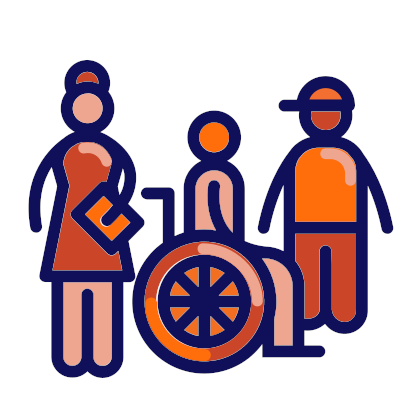Tackling discrimination

Schools can tackle discrimination by promoting democracy, respect for human rights and citizenship.
To ensure that all students’ needs are met equally, schools need to prioritise language and cultural competences, multiperspectivity in history and gender equality. In this way, students can acquire competences for democratic culture, to fulfil their potential in school as well as in society.
Facts & figures
Students with disabilities in Europe have higher early-school leaving-rates than their same-age peers.[1]
Black Caribbean students are three times more likely to be excluded from English schools than white pupils. [2]
A survey of nine EU countries showed that 33% of Roma students were in schools where most pupils were Roma, with 13% in Roma-only schools.[3]
What is discrimination?
Discrimination is treating a person badly or unfairly on account of a personal characteristic, such as national, ethnic or social origin, gender, language, religion, disability or sexual orientation.
There are two basic forms of discrimination:
- Direct discrimination – treating someone less favourably than you treat or would treat another person in the same situation, e.g., a school refusing to admit a student because they are Roma,
- Indirect discrimination – applying a provision, criterion or practice in the same way for all of a group which has the effect of unfairly disadvantaging people in the group who share a particular characteristic, e.g., a school uniform policy banning headgears for girls and boys may unfairly disadvantage Muslim girls and Jewish boys.
Discrimination can occur in almost any aspect of school life, from the attitudes and expectations of teachers to school rules and codes of conduct, selection and grouping practices, curricula, teaching methods and materials, changing facilities, career guidance, canteen food and the physical school environment.
Whatever form it takes – whether it be parallel school systems for different ethnic groups, concentrations of minority or disadvantaged children in the same school, or differential access to educational provision, it means a lower quality of educational experience for the students being discriminated against.
Why is tackling discrimination important at school?
Discrimination is a human rights violation. Article 14 of the European Convention on Human Rights contains a prohibition on discrimination with respect to any of the rights and freedoms guaranteed under the Convention. Article 2 of Protocol No.1 requires the state to ensure that all individuals have access to its formal educational provision.
“No person shall be denied the right to education.”[4]
“The enjoyment of the rights and freedoms set forth in this Convention shall be secured without discrimination on any ground such as sex, race, colour, language, religion, political or other opinion, national or social origin, association with a national minority, property, birth or other status.”[5]
Tackling discrimination is not simply a duty laid on schools by the European Convention of Human Rights, it is also important for student well-being and educational success. Children and young people who are treated unfairly or discriminated against are more likely to have:
- negative attitudes to school
- lower levels of motivation and academic achievement
- a higher risk of dropping out of formal education
- experience of bullying
- mental health problems.
Feeling different or ‘less’ than others can be an isolating experience. Over time it undermines an individual’s capacity for participation in society, e.g., their sense of self-efficacy, openness to other cultures and beliefs, tolerance of ambiguity and flexibility and adaptability - all of which lie at the heart of the Council of Europe Reference Framework of Competences for Democratic Culture.
Lack of opportunity due to discrimination in school also damages society. It intensifies social divisions, fuels xenophobia and intolerance and undermines social cohesion.
“States should adopt a combination of strong anti-discrimination measures and policies that promote more inclusive education systems where all children learn together. This is not a utopian project, but an achievable goal that can ensure more equal treatment of all children and, in the long term, improve social cohesion”[6]
What are the challenges?
One of the challenges facing the tackling of discrimination in schools is a lack of data. European-wide statistics specifically focused on discrimination in schools are scarce. Children with disabilities, for example, do not always appear in national statistics and may be ‘invisible’ to decision-makers, service providers and the public. Such children are particularly vulnerable to discrimination, however, and are often segregated in terms of educational provision.
These are not the only ‘invisible’ minorities in schools. For example, LGBTI students often feel they have to hide their sexual orientation at school to avoid victimisation.
Another key challenge is the existence of negative stereotypes about minority groups among teachers, parents, students and other school stakeholders. Such stereotypes are often deeply embedded in everyday school life and practice, so much so that they are taken as ‘normal’, e.g., stories and images in textbooks that reflect a stereotyped portrayal of the roles of women and men, girls and boys. Stereotypes help to fuel prejudiced and aggressive behaviour between students, lower expectations from teachers and negative attitudes from parents, e.g., refusing to allow their children to be taught alongside refugee or migrant children.
Stereotyping is difficult to root out in schools because its origins lie in wider society. This is exacerbated by the current preponderance of hate speech, fake news and conspiracy theories in digital media, especially social media.
The situation is compounded when minority groups are under-represented on school staff. Students lack role - models and teachers do not have the access to information about or insights into other cultures and ways of life that come with belonging to a more diverse profession. They lack the intercultural competences with which to create inclusive and quality learning environments, e.g., openness to cultural otherness, tolerance of ambiguity, plurilingual skills and knowledge and critical understanding of alternative cultures, religions and histories.
Tackling discrimination is more challenging when there is a lack of dialogue between schools and parents. Often this is on account of language difficulties, but it is also a problem where students’ parents work abroad leaving their children in the charge of elderly relatives or others.
How can schools get active?
Ensuring all learners of any age are provided with meaningful, high-quality educational opportunities alongside their peers requires a whole-school approach.
It begins by schools understanding who might be at risk of discrimination, what they can do to minimise discrimination and how they can support students at risk of discrimination. A good place to start is with an assessment of the current situation, identifying the strengths that exist in the school, but also needs and priorities. Consulting with school stakeholders is essential, especially students and, where possible, parents – e.g., using surveys, questionnaires, focus groups, etc. Given the sensitivities involved there is argument for collecting information on individuals’ experiences of discrimination anonymously.
Based on an assessment of the current situation it is possible to identify immediate priorities for policy development. Priorities will vary with the school, but might include, for example:
- language development
- gender equality
- accessibility of the physical environment
- intercultural competences.
The setting of initial priorities should go hand in hand with professional development for senior leadership teams as well as teaching staff. An element of personal as well as professional reflection is essential to the tackling of discrimination in school. In particular, it is important for school staff to be able to consider their own beliefs and values with regard to discrimination, including their own unconscious biases and prejudices.
Schools can then turn to the longer-term aspiration of creating a culture of non-discrimination. Central to this process is the challenging of negative stereotyping, both in classrooms and around the school. This can be done in a variety of ways, including:
- challenging stereotypes when they are heard
- discussing stereotypes with students
- identifying stereotypes in the curriculum
- highlighting stereotypical images and roles in textbooks
- allocating posts of responsibility equitably
- choosing different ways of dividing up students
- providing a range of role-models
- setting up mechanisms for monitoring incidents of discrimination.
Challenging stereotypes goes alongside the promotion of inclusion and an appreciation of the benefits of diversity in school life. This can take different forms, including:
- using inclusive language
- including human rights, democratic citizenship and intercultural education in the curriculum
- encouraging the discussion of controversial issues
- promoting student voice
- involving students in peer education and peer mediation activities
- welcoming parents and involving them in school decision-making
- forming partnerships with different organisations and groups in the community.
[1] Education section of the The European Disability Forum
[2] Article: UK: Racial discrimination is a reality in schools and classrooms. Education International
[3] EU Fundamental Rights Agency, “Second European Union Minorities and Discrimination Survey (EU-MIDIS II) Roma – Selected findings” (2017).
[4] ECHR, Article 2, Protocol No.1
[6] Position paper: Fighting school segregation in Europe through inclusive education by the Council of Europe Commissioner for Human Rights
 Resources on Tackling discrimination
Resources on Tackling discrimination
Address: Makrygialos of Pieria
Country: Greece
Project: Journalistic Student Conference
 Working language during the project:
Working language during the project:
- Greek
 Themes of the Council of Europe campaign “FREE to SPEAK, SAFE to LEARN - Democratic Schools for All” covered:
Themes of the Council of Europe campaign “FREE to SPEAK, SAFE to LEARN - Democratic Schools for All” covered:
- Dealing with propaganda, misinformation and fake news
 Competences from the Reference Framework of Competences for Democratic Culture (CDC) addressed and where / how they were integrated:
Competences from the Reference Framework of Competences for Democratic Culture (CDC) addressed and where / how they were integrated:
- Values:
All students participate in our action, regardless of their particularities (background, cultural environment, disability) and develop valuing human dignity and human rights, cultural diversity, democracy, justice, equality and the rule of law. - Attitudes and Skills:
As they participate in collaborative actions they develop attitudes like openness to cultural otherness and to other beliefs, respect, responsibility, autonomous learning skills, analytical and critical thinking skills, co-operation skills and conflict-resolution skills. - Knowledge and critical understanding:
As student-journalists develop skills, like knowledge and critical understanding of language and communication, Knowledge and critical understanding of the world: politics, law, human rights, culture, cultures, religions, history, media, economies, environment, sustainability.
 Target group age range:
Target group age range:
- 11-15
 Level of education:
Level of education:
- Lower secondary education
Short description of the project:
 Aims/objectives
Aims/objectives
Makrygialos High School is a small provincial school in Macedonia of Greece with a large percentage of foreign students, in which we develop educational actions with pan-Hellenic distinctions, such as editing of the school newspaper, theatrical performances and other cultural and environmental activities.
The challenge for the students is to publish the school newspaper, to educate them in dealing with the the media and to embrace the principles of democracy and free expression. Thus, in the framework of the educational programme "Publication of the School Newspaper", they participate in the writing and publication of their school newspaper with the supervision of the School Director Mrs. Evangelia Kanali, aiming at informing and raising awareness public opinion on social, cultural, environmental, school life, health and nutrition education.
The highlight of this programme is the organisation of a “Journalistic Student Conference” aimed at students and teachers of the High Schools and the Lyceums in Pieria who issue or plan to publish school newspapers. It is an innovative educational programme that was implemented in Greece for the first time by a school and aims at educating students and teachers with media issues such as writing articles, selecting themes, gathering records, practical application, but mainly embraces the principles of intimate, honest, unselfish and democratic journalism. The Conference was held on 27 March 2018 and was attended by 307 students and 72 teachers from 17 High Schools and Lyceums in Pieria. This innovative action was selected from among 748 schools across Europe to be presented in the Oslo conference in which the new Council of Europe education campaign “Free to Speak, Safe to Learn - Democratic Schools for All” was launched in November 2018.
The Makrygialos High School journalistic group will continue this programme in the school year 2018-2019 and will organise the “2nd Journalistic Student Conference” aimed at training students and teachers in electronic journalism and in entrepreneurship, giving students experience of business processes (marketing, advertising, revenue management for public purposes, business plan). During the 2nd Conference, they will organize a Pieria School Newspaper Exhibition, so that the local society of school newspapers can see the students’ reflections and interesting creations. The Conference will be extended to the region of Central Macedonia and later to the whole of Greece, with the ultimate goal of becoming an institution for the country’s educational community. In addition, in April 2019 they will present their innovative action to students and teachers from the Istituto D’Istruzione Superiore – “Sandro Pertini” in Lucca in Italy, with whom they are twinned, hoping that it will result in a collaboration between the two schools and the developing of joint actions.
 Expected results/outcomes
Expected results/outcomes
Our innovative educational action
It is vital for a democratic school to provide students with a solid education on media and information literacy as part of the curriculum. The writing and production of school newspapers serves the basic purposes of Education, as it is an interdisciplinary activity consistent with the curriculum that combines multimodality, cooperation, critical ability, cognitive and linguistic development of students. However, journalist groups feel strongly about the need for expert information on issues related to writing and publishing school newspapers, such as:
- What are the stages of creating a newspaper?
- How to write an article, an essay, an interview, a documentary?
- What constraints are imposed by journalistic ethics, such as objectivity, impartiality, but also misinformation, misleading public opinion?
- How to avoid getting lost in the stream of information or being victim of propaganda and fake news?
- How is the management of economic issues related to the production of the newspaper?
The Director of Makrygialos High School Mrs. Evangelia Kanali, along with her student journalists, took the initiative of planning and organising the “Journalistic Student Conference” for students and teachers of High Schools and Lyceums in Pieria which issue or plan to issue school newspapers, as the schools do not have their own professional journalists. For this purpose they invited high-level media industry specialists to teach students and teachers about issues related to editing school newspapers and to basic concepts of journalistic ethics.
The Conference’s second objective was the school newspaper award. Every year, schools produce a significant number of student newspapers, the appeal of which is limited to the narrow boundaries of the local community or the school community. For this reason, the Makrygialos High School journalistic team wanted to promote and award school newspapers of High Schools and Lyceums in Pieria to motivate them into creating something new. The team presented all the school newspapers in Pieria and the Conference Review Committee awarded the "Best High School Newspaper" and the "Best Lyceum Newspaper”. The evaluation criteria used were: the variety of subjects, social, cultural and environmental issues, the correct use of language, the quality of journalistic speech.
The Conference’s third objective was a contribution to Local Educational History. The Makrygialos High School journalistic team gathered together all newspapers from Pieria’s High Schools and Lyceums so as to make an Archive of School Newspapers, to ensure they are not lost in time and with the hope that this initiative will be a small achievement in the History of the Pieria Student Press. Thereafter, the aim is to compile an archive of all the school newspapers published during the year for each subsequent Journalistic Student Conference with a view to submitting the archive at a future date to the General State Archives. Their next goal is to organise an Exhibition of the Pieria School Papers, in the belief that the promotion of school newspapers is an important factor for presenting children's views, highlighting their talents and communicating the school with their social environment.
The fourth objective of the Conference was to provide feedback to student journalists and their respective teachers. The Makrygialos High School journalist team invited archaeologists to show the students and teachers rare archaeological finds kept at the Makrygialos Museum, thus giving students the opportunity to report on, interview or write an article in their newspapers and take an active role as a journalist. At the same time, the Makrygialos High School journalistic team aimed to give visibility to the newly established Archaeological Museum of Makrygialos and to encourage Pieria schools to visit it, a goal that was immediately achieved.
 Changes
Changes
Innovative features of this educational action
The Journalistic Student Conference is an innovative event created by a democratic school. It- sets up a network of communication for the school journalist groups in Pieria and for exchanging views on important social, political and cultural issues, such as peace, democracy, equality, diversity, environment, education. It gave them the opportunity to inspire each other, to interact and take part in new creations in a spirit of co-operation and teamwork.
The Makrygialos High School journalistic group developed constructive co-operation with the Directorate of Education of Pieria, the local authorities, the local community and the Parents' Association, and asked them for funding for the awards and the Conference organization. They all responded to this request, recognizing the multiple benefits for the educational community and the city of Pieria from a democratic school open to society.
In evaluating the innovative character of this educational programme, it is clear that the above initiatives were developed by students with a different national, cultural background who:
- through their newspaper seek to gain a "step" and "voice" to express themselves, to communicate with the world around them
- through their articles, documentaries and interviews, claim the truth and raise public awareness of important issues
- listen to the needs of the educational community and strive to contribute to their innovative initiatives
- see another side of education; one where they are not empty pots filled with sterile, irrelevant knowledge, but responsible, participatory citizens who can become actors of school and social life.
The Journalistic Student Conference is an action of a democratic school that gives the opportunity to all pupils, regardless of their particularities (origin, cultural environment, disability):
- learn how to learn, how to conquer exploration and cooperative knowledge;
- develop critical ability and scientific thought to explore the causes or the consequences of problems;
- seek and disseminate information and ideas from around the world through their school papers;
- transform original ideas into innovative applications and activate their talent and skills for expression and creation;
- practice the recording of different textual items, such as articles, essays, interviews, documentaries and the production of oral and written speech;
- develop social and communication skills such as responsibility, planning, strategy and planning skills, needs analysis, organizational, teamwork and communication, decision-making and problem-solving strategies to become active in the future and socially sensitive citizens.
The Conference gives teachers the opportunity to understand that they should:
- teach their students how to collaborate by taking roles and to feel creative by composing one or more sheets of their newspaper
- be proud of the collective work, overcoming individualism and personal insecurities
- ensure a pleasant and attractive school environment for all pupils without discrimination or exclusion
- organise school life according to the democratic principles of freedom, dialogue, equality, justice, respect for diversity
In addition, students and teachers following the suggestions of the high-level media industry specialist journalists get to:
- realize the power of the press and the importance of the news
- become familiar with press-related concepts such as misinformation, false news, brainwashing, propaganda, anaesthetising of receivers;
- learn to apply and exploit a variety of different sources of data acquisition, but also critically manage the knowledge they derive from the internet
- understand the concept of a cross-thematic approach to information
- sharpen their critical thinking and perceptions to identify useful information from unnecessary information, insignificant events from worthwhile news
- learn to use methods and practices of science, technology and the arts to investigate, judge, comment, argue, and express themselves artistically
- practice a variety of writing styles, such as article, essay, interview, documentaries, op-ed.
The media journalists also help students and teachers to understand that propaganda, misinformation and fake news can polarise public opinion and undermine democracies and that there is a duty to apply the following fundamental principles of journalistic ethics:
- utilise a variety of different sources for data mining and learn to distinguish useful information from unnecessary information
- collect, cross-check and document information
- keep professional secrecy about information sources
- transmit news regardless of their personal political, social and religious beliefs.
- avoid legal difficulties by working responsibly and according to professional ethics.
- publicize the truth objectively and impartially and not by misleading public opinion with false news and propaganda.
 Challenges you faced
Challenges you faced
Organising the Journalistic Student Conference was a bold and difficult task. The challenges were important, but the benefits were great. Press articles, TV quotes and letters of congratulation - now in the school archive - all demonstrated that a small provincial school managed for the first time in our country to organise a Conference with high-reaching goals and a strong impact on the local and wider society.
To sum up, the Journalistic Student Conference is an innovative pedagogical action of a school operating according to democratic principles such as freedom and responsibility, participation, equality and justice. A school where teachers offer not only knowledge but vision and passion for their job and open new horizons according to the interests and sensitivities of students who in turn learn to go beyond the narrow boundaries of the school and become creative, responsible and active citizens in keeping with democratic culture.
 Time-frame of the project:
Time-frame of the project:
The Makrygialos High School journalistic group will continue this programme in the school year 2018-2019 and will organise the “2nd Journalistic Student Conference” aimed at training students and teachers in electronic journalism and in entrepreneurship, giving students experience of business processes (marketing, advertising, revenue management for public purposes, business plan). The Conference will be extended to the region of Central Macedonia and later to the whole of Greece, with the ultimate goal of becoming an institution for the country’s educational community.
 Council of Europe materials on citizenship and human rights education used while preparing or implementing your practice:
Council of Europe materials on citizenship and human rights education used while preparing or implementing your practice:
- Reference Framework of Competences for Democratic Culture
- Living Democracy - manuals for teachers
- Democratic governance of schools
- All Different – All Equal
- Managing controversy
- Teaching controversial issues-training pack
- Signposts
- We CAN!
- Mirrors
- Human Rights and Democracy Start with Us – Charter for All
- Freedom(s) - Learning activities for secondary schools on the case law of the European Court of Human Rights
- How all Teachers Can Support EDC/HRE: A Framework for the Development of Competences
- Multimedia Material (ex. video “Beat Bullying”, series of cartoons “Democracy and Human Rights at School”, video “Corporal punishment at school: how two parents decided to change things”)
 Related schools projects
Related schools projects
Bosnia and Herzegovina
Bulgaria
Cyprus
Finland
France
Georgia
Germany
Greece
Ireland
Italy
Lithuania
Malta
Montenegro
Norway
Portugal
Republic of Moldova
Romania
Serbia
Slovenia
Spain
Turkey
United Kingdom







